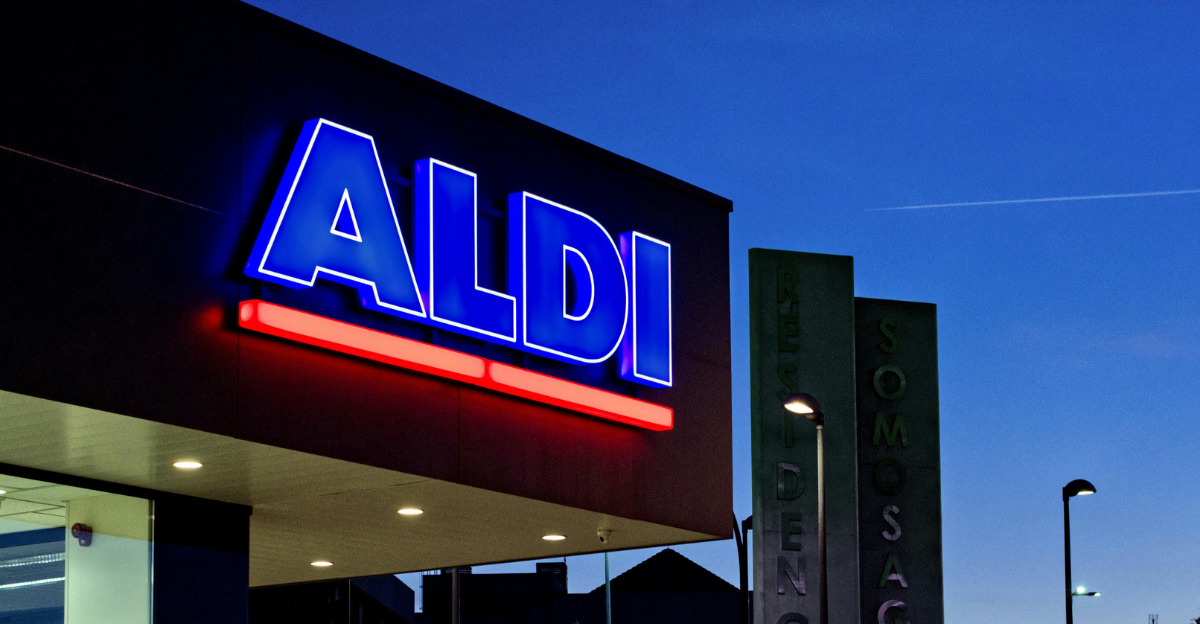
For the summer of 2025, Aldi has announced a massive price cut on more than 400 necessities, or nearly 25% of its stock, across its 2,400+ locations in the United States. With savings of up to 33% on popular seasonal products like fresh meat, produce, pantry essentials, and snacks. Aldi’s strategy, which solidifies its position as the country’s grocery retail price leader, is an extension of its regular low-price model rather than a gimmick.
The goal of this program is to provide households with immediate, noticeable relief during the busiest summer months. The price reduction highlights Aldi’s willingness to lead the market on value rather than just volume and sends a competitive message to other retailers.
Aldi’s DNA through Historical Roots

Aldi’s dedication to affordability stems from its post-World War II beginnings. By providing upfront price reductions instead of post-sale rebates, the Albrecht brothers invented the discount grocery model in Germany and distinguished Aldi from conventional cooperatives. Aldi’s worldwide growth was based on its straightforward strategy, which included little advertising, a simplified product selection, and unrelenting cost control.
Since customers have long relied on Aldi for dependable affordability, this heritage also helps to explain the retailer’s tenacity during recessions. The historical account shows that Aldi’s discounting is a strategic philosophy ingrained in its corporate DNA rather than a temporary strategy, allowing it to adapt and prosper in the face of shifting consumer expectations and market dynamics.
Trends in Consumer Behavior

Aldi’s price reductions are timed strategically. Summertime is a time of increased spending because of holidays and get-togethers, and two-thirds of Americans are very worried about grocery prices. Food prices have increased due to supply chain disruptions and inflation, placing a strain on household budgets. Aldi’s decision directly addresses these concerns and provides comfort when it’s most needed.
Additionally, the price cut capitalizes on a larger trend of value-conscious purchasing, in which buyers place a higher value on quality and affordability than on premium products or brand loyalty. Aldi positions itself as a reliable partner in household financial management by adapting to these complex consumer behaviors, which not only increases short-term sales but also fortifies long-term customer relationships.
Using Relief to Foster Loyalty

Aldi uses the psychological concepts of reciprocity and trust in their price reduction strategy. Aldi strengthens its reputation as a consumer ally rather than merely a retailer by offering noticeable, significant savings on daily necessities. As consumers witness the instant restoration of their purchasing power, this fosters goodwill and strengthens brand loyalty.
By appealing to the cognitive bias known as the “pain of paying,” price reductions make shopping less stressful and more pleasurable for customers. Aldi’s approach also combats the weariness that customers experience from intricate loyalty programs and promotions by providing a straightforward, sincere value proposition that strikes a deep chord. Aldi’s competitive edge and steady growth are mainly due to this psychological base.
Deflationary Play in an Inflationary World

The majority of retailers use price increases as a hedge against inflation, but Aldi’s aggressive discounting is a brilliant counterintuitive move. Aldi’s low-cost, high-margin business model works well in both inflationary and deflationary conditions. Regardless of the state of the market, the company can undercut rivals by up to 20% on necessities thanks to its efficient supply chain, reliance on private labels, and operational effectiveness.
Aldi’s strategy refutes the widely held belief that consumers must pay more for inflation by showing that strategic pricing and cost control can preserve margins while providing value. The strategy used by Aldi is a prime example of how a retailer can preserve profitability without compromising price competitiveness by utilizing scale, supplier relationships, and lean operations.
The Ripple Effect: Driving Change Across the Industry

Not only do Aldi’s price reductions benefit its customers, but they also establish a new standard for the grocery industry as a whole. Already struggling with slow growth and changing customer preferences, traditional supermarkets are now under pressure to adapt or risk losing market share. Rivals are being forced to reconsider their oversized product assortments and expensive overhead as a result of Aldi’s model of operational efficiency and unwavering price discipline, which is changing the competitive landscape.
To stay afloat, rivals might have to simplify their products or implement technology-driven efficiencies. The viability of premium pricing strategies is also called into question by Aldi’s success, particularly as consumers grow more cost conscious. A more divided market could result from this industry-wide upheaval.
Tech and Sustainability Meet Grocery

Price is only one aspect of Aldi’s strategy. The company’s digital expansion, which includes same-day delivery and app-based shopping, improves accessibility and convenience while appealing to time-pressed, tech-savvy customers. Aldi’s emphasis on private labels, on the other hand, enables stricter supply chain management, which can be used to support sustainability projects like less packaging and less food waste.
The growing demand from consumers for ethical consumption is in line with sustainability initiatives like lowering carbon footprints and sourcing local produce. In addition to setting Aldi apart from rivals, this inventive mashup foreshadows future retail trends in which responsibility and value coexist. Aldi’s strategy proposes a new paradigm for retail, one in which sustainability, innovation, and affordability all support one another.
Extreme Example

Imagine a speculative but likely scenario: Aldi’s steep price reductions and effective business strategy would make it a lifeline for millions of people in an unexpected economic downturn or recession. The demand for reasonably priced, high-quality groceries would increase as unemployment rates rise and disposable incomes decline. This tenacity demonstrates how sound Aldi’s approach is.
Aldi’s recent price reduction puts it in a proactive position to benefit from these changes and fosters a devoted following that goes beyond the economic recovery. This situation demonstrates the strategic vision ingrained in Aldi’s pricing and business strategy, which puts stability over profits in the long run.
Issues and Remedies

Aldi depends on a small selection of core SKUs, solid supplier relationships, and a few in-store extras to maintain steep discounts. Consumers bag their own groceries, and labor costs are decreased by the cart deposit system. In addition to saving money, these efficiencies are essential to Aldi’s capacity to fulfill its promise of year-round affordability, even as rivals struggle with growing expenses. However, keeping this equilibrium calls for ongoing innovation in cost control and supply chain logistics.
Aldi makes technology investments to cut waste and streamline inventory while negotiating hard with suppliers to get good terms. Aldi is able to maintain its price leadership without sacrificing customer satisfaction or business viability thanks to this methodical approach.
Concluding Remarks

More than just a seasonal sale, Aldi’s decision to drastically reduce the cost of 400 essentials is a daring challenge to the status quo and a strategic reaffirmation of the company’s core values. Aldi establishes new industry standards, builds consumer trust and loyalty, and establishes itself as the grocery store most suited to prosper in any economic environment by providing customers with instant, quantifiable relief.
Aldi’s approach is a prime example of how a retailer can reshape market dynamics by utilizing consumer insight, operational discipline, and strategic pricing. In the face of economic uncertainty, it presents consumers with a compelling alternative and forces rivals to reconsider their business models. In the end, Aldi’s price reduction is a brilliant move in terms of strategy, timing, and vision that will have an impact long after 2025’s summer.
Discover more DIY hacks and style inspo- Follow us to keep the glow-up coming to your feed!

Love content like this? Tap Follow at the top of the page to stay in the loop with the latest beauty trends, DIY tips, and style inspo. Don’t forget to share your thoughts in the comments — we love hearing from you!